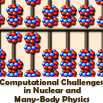Speakers
Doru Sabin Delion
Peter Schuck
Description
Alpha-decay: a computational challenge
D.S. Delion, R.J. Liotta, and A. Dumitrescu
The microscopic description of alpha decay widths is an old
but still challenging issue. The standard mean field plus
residual interaction is not able to reproduce the absolute
value of the decay width. We propose two ways to cure this
defficiency, namely by introducing a new single particle
diagonalization basis with two harmonic oscillator
parameters [1] and by increasing proton-neutron correlations
through a surface cluster component in addition to the
standard nuclear the mean field [2]. We describe alpha decay
fine structure by using a common approach for spherical,
transitional and deformed nuclei [3]. The investigation of
the alpha decay fine structure is a powerfull tool to probe
nuclear structure. We use projected coherent states to
describe the structure of daugher nuclei and a
quadrupole-quadrupole alpha-core interaction for alpha
transitions to excited states. It turns out that the
strength of this interaction, reproducing alpha transitions
to 2+ states, is proportional to the clustering
probability. Predictions for electromagnetic and alpha
transitions to excited state are made for all available
even-even emitters. The coupled channel analysis for alpha
transitions in odd mass nuclei is proposed as a promising
tool to investigate nuclear structure, by the using both
spectroscopic and alpha decay data.
This work was supported by the strategic grant
POSDRU/159/1.5/S/137750 and by the grant
PN-II-ID-PCE-2011-3-0092 of the Romanian ANCS.
[1] D.S. Delion, A. Insolia, R.J. Liotta, Physical Review C
54, 292 (1996).
[2] D.S. Delion, R.J. Liotta, Physical Review C 87, 024309
(2013).
[3] D.S. Delion, A. Dumitrescu, Physical Review C 87,
041302(R) (2013).

